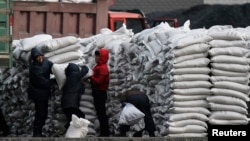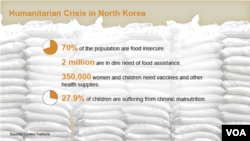The United Nations has launched an appeal for $111 million to help a vast portion of North Korea's population now facing a food crisis.
U.N. Humanitarian Coordinator for North Korea Ghulam Isaczai told VOA the funding will help five U.N. aid agencies working on the ground to continue providing North Koreans with food, clean water and other basics in 2015.
"We are appealing for more aid and support to keep the U.N. operation going. And if we don't provide the support, the gains we have made over the years will be reversed," Isaczai said Wednesday.
The United Nations says 70 percent of the population, or 18 million North Koreans, are food insecure and lack nutritional diversity.
But Isaczai said of those, nearly 2 million, mostly children, pregnant and lactating women and the elderly, are in dire need of food assistance, and another 350,000 women and children need vaccines and health supplies.
Malnutrition rates are high, with 27.9 percent of children under five suffering from chronic malnutrition, according to a 2012 national nutrition survey quoted by the U.N.
North Korea has suffered regular chronic food shortages, with the situation exacerbated by floods, droughts and mismanagement.
The U.N. is working with the North Korean government to come up with a new 5-year plan in an attempt to address the structural causes of malnutrition and other humanitarian crises, Isaczai said.
In some cases, Isaczai said, the U.N.'s aid operations have been hampered by international sanctions against North Korea, even though he adds that none of the restrictions are technically aimed at humanitarian assistance.
"Some of the operational challenges that we face are, for instance, banking. For much of 2013 and 2014 we were not able to transfer funds to support our activities. Also sometimes we experience delays in procurement," he said.
"We have to meet all the requirements for licensing and ensuring we do not bring in equipment or supplies that are clearly put on the sanctions list. So it does have some consequences, but we’ve been able to work around them and still bring in humanitarian aid to support the population,” said Isaczai.






